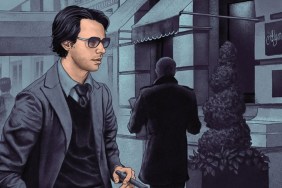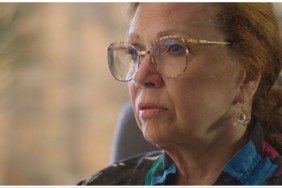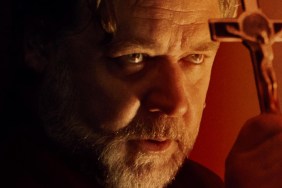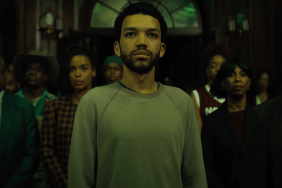
I already saw Roger Ebert has compared Anton Corbijn’s The American to Jean-Pierre Melville’s Le Samourai so I won’t try to pass the thought off as an original, but it must be mentioned because the comparison is so appropriate. While George Clooney doesn’t slide into his role in The American as skillfully as Alain Delon played Jef Costello in Samourai, the similar workmanlike and dedicated nature of the two characters is unmistakable.
The American, like Le Samourai isn’t the modern day shoot ’em up actioner you expect when you hear the words “assassin film,” instead it’s more of a moody and methodical piece that never relies on action set pieces or explosions to raise the tension, but remains about as tense as it can get nonetheless.
Adapted by Rowan Joffe (writer/director of the upcoming Brighton Rock), the film is based on the Martin Booth novel “A Very Private Gentleman,” a title that should give you a good indication of Clooney’s character right off the bat as he plays the titular “American” at the film’s core. Jack (Clooney), Edward or “Mr. Butterfly” depending on who he’s talking to, is an assassin and master craftsman, though as skilled as he is we never get the impression he enjoys what he does.
“We do what we do best,” he confesses to a kindly local priest (Paolo Bonacelli) as he’s currently hiding in a small town in a remote mountain region outside of Rome, preparing for what he means to be his final job. The order has come down and he’s met with a fellow tradesman (Thekla Reuten) who details the specifications for the rifle she needs built. Wary of everyone and looking around every corner after recently being attacked in Sweden, Jack trusts no one and his paranoia and equal dedication to his job keeps The American from merely simmering and instead warming to an outright boil.
However, while boiling with tension, The American never shies from its core emotion, the human need for companionship. Clooney adds another level to the film’s already tense atmosphere by playing Jack with a sense of bewilderment and confusion. As in control as Jack is when he’s working, he seems wholly unfamiliar with the emptiness he feels and the loneliness that comes with the profession he’s chosen. It hits him hard in the film’s opening scene and it becomes more evident as he comes to know a local prostitute (the often unnecessarily naked Violante Placido) in the process of trying to stay alive.
Dutch photographer and director Anton Corbijn is probably best known for his work as a music video director with the likes of U2 and Depeche Mode, but in 2007 he directed the little seen, but nevertheless great film Control based on the life of Joy Division frontman Ian Curtis. It was not only a great, evenly-paced feature debut, it was a beautiful film, and Corbijn’s brought a similarly appealing photographic eye to The American.
Considering the film was shot in Italy you’d think it would be washed away in glowing sunsets over the Italian countryside. Instead it starts in snowy stark white terrain and then turns to the cold and grey cobblestones of a remote Italian village in the Apennine mountains. Only the amber glows of street lights met with occasional rain showers offer much color. Even when Corbijn decides to film in nature he relegates himself to a creek side you could find anywhere in the United States, let alone the remote corners of Italy.
These types of directorial decisions show Corbijn’s dedication to character rather than an interest in merely dolling the film up with landscape inserts. Instead he chooses much more difficult shots, such as a shot featuring only the faces of Clooney (head on) and Bonacelli (in profile) as the they get into a discussion of sin that may be the best shot I have seen all year.
I have very few complaints about The American in general, though it seems the nudity could have been cut outright and the film would have achieved a PG-13 rating. I can’t understand why some have said it is slow. Perhaps it’s because Joffe’s screenplay isn’t overloaded with dialogue and needless exposition. Instead it’s more cerebral and introspective. You won’t hear me complaining about this.
Nearly every frame is filled with paranoid tension. Jack is searching for something, but you get the impression he’s not sure what it is and even if he found it he might not trust what he finds.
In The American if there’s a moment that isn’t explicitly tense it’s implicitly so, thanks not only to the nature of the story, but Corbijn’s framing of the image. What’s on screen in this film is just as important as what’s not and getting into the mind of Jack is one of the hardest nuts to crack so far this year. I expect repeat viewings will prove beneficial and I hope to see it at least one more time before it ends what I expect will be a limited theatrical run.










